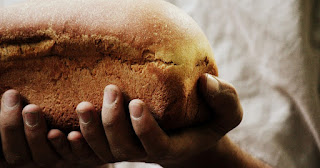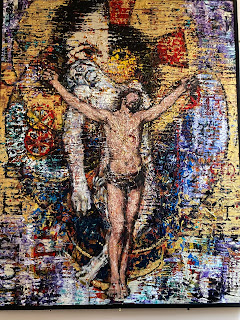Are We Tired of God's Bread?
Give us this day our daily bread!
These are words that Jesus taught his followers to pray. We say them every week in worship. We teach them to our children and we see them printed on cards and plates. Give us God what we need for this day, no more and no less.
In the Old Testament (Exodus 16) when God led the Hebrew people out of slavery in Egypt, it didn’t take long for the people, in the discomfort of the unfamiliar wilderness, to start complaining to God. They were hungry. They at least had food back in Egypt and were wondering what sort of journey this was that God now had them on. God responded to their cries, providing bread every morning for the people to collect. There was one caveat, the people couldn’t take more than they would need for the day. If they tried to hoard for the next day or week, it would rot. When Jesus teaches to pray for “daily bread”, it is a clear reference to this story.
God’s bread sustained the people in the wilderness. In time, though, the people grew tired of God’s bread. In Numbers 11 we are told that they once more complain to God. They want something besides bread and again longed for the things they had in Egypt: fish, cucumbers, melons ,etc. They had grown tired of God’s bread!
This week at a meeting in Atlanta, I heard a seminary professor at Emory, Dr. L. Edward Philips, make a powerful statement, “We Christians today too often act like we are tired of God’s bread!” Instead of the things we know sustain us (faith, church community, Bible study, prayer, service to those in need, worship, Holy Communion, etc.) we long for other things. We get distracted by less important things. We seek things that are more exciting, trendy, entertaining, or fun. Maybe we don’t complain out loud like the Hebrew people did, but we do the same when other things become priority.
Further, if I may speak personally, like the Hebrew people I too often want God to provide a different kind of bread. I would rather God’s bread meet my preferences and desires, rather than being thankful for the bread that God is offering. I become disappointed when my definition of bread and God’s looks different. Instead, I should be content with God’s bread, not absorbed my own vision of what that bread should be.
I think Jesus also had this story of the Hebrew people complaining in mind when he said, “I am the bread of life” (John 6:35). Jesus has heard our cries and complaints in the wilderness of life still today. He is the bread God gives for a meaningful and fulfilling life on this earth and hereafter, what the Bible calls abundant or eternal life. It is there for the taking. May we not grow tired of this bread, even though there will always be more shiny things drawing our attention. May we also not miss God’s bread because we are complaining about wanting something different.
Give us this day, our daily bread! Amen.
Together we are the hands and feet of Jesus,
Brett



Comments
Post a Comment